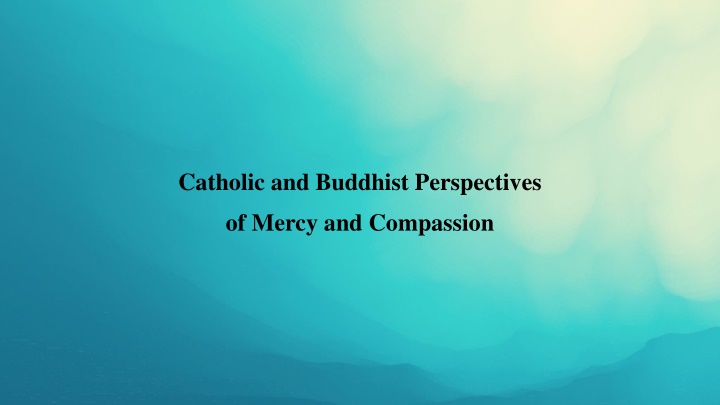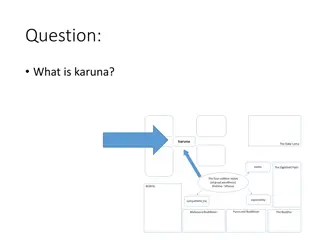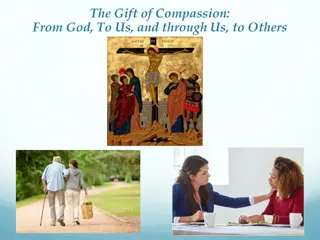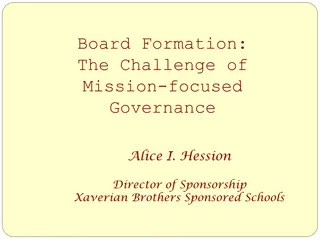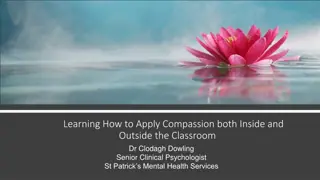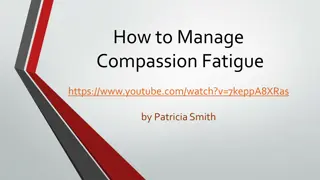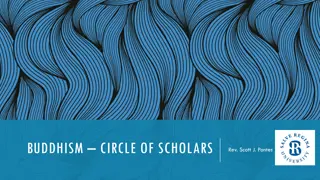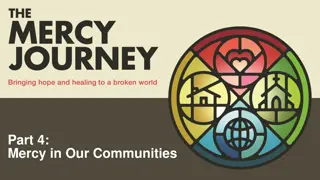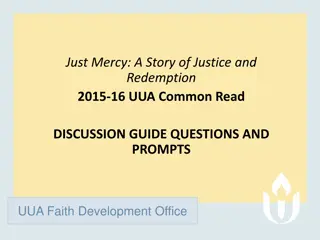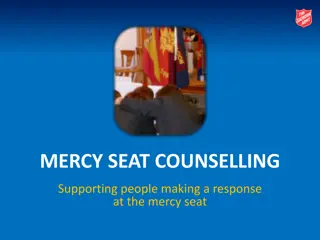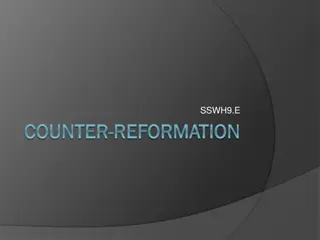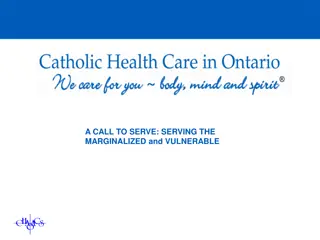Perspectives on Mercy and Compassion in Catholic and Buddhist Teachings
Explore the views of the Catholic Church and Buddhist perspectives on mercy, compassion, and interfaith relationships. The Catholic Church emphasizes respect and collaboration with other religions, while highlighting the importance of mercy and love in Christian teachings. This blend of spiritual truths and compassionate actions resonates across both traditions, promoting understanding and goodwill among different faiths.
Download Presentation

Please find below an Image/Link to download the presentation.
The content on the website is provided AS IS for your information and personal use only. It may not be sold, licensed, or shared on other websites without obtaining consent from the author.If you encounter any issues during the download, it is possible that the publisher has removed the file from their server.
You are allowed to download the files provided on this website for personal or commercial use, subject to the condition that they are used lawfully. All files are the property of their respective owners.
The content on the website is provided AS IS for your information and personal use only. It may not be sold, licensed, or shared on other websites without obtaining consent from the author.
E N D
Presentation Transcript
Catholic and Buddhist Perspectives of Mercy and Compassion
What does the Catholic Church have to say about the Relationship between Catholics and Non Christians?
The Catholic Church rejects nothing of what is true and holy in these religions .. The Church therefore urges her (children) to enter with prudence and charity into discussion and collaboration with members of other religions. (Nostra Aetate, 2)
Let Christians while they are witnessing to their own way of life, acknowledge, preserve and encourage the spiritual and moral truths found among other non-Christians.. (Nostra Aetate, 2)
Felix Machado from the Pontifical Council for Interreligious Dialogue has this to say: The Church teaches that to be a good Christian we need to be open to and respectful of others, to whatever Religious tradition they belong. ( Journeying Together , p10).
What place does Mercy have in the Catholic Christian religion?
Word Mercy loving kindness compassion steadfast love
Womb compassion emanating from the depths of ones being and motivating action of loving kindness or steadfast enduring love
"What must I do to inherit Eternal Life?". (Luke 10:25)
"What is written in the Law?" You shall love God with all your heart, with all your soul and with all your strength. (Deut 6:4) And you must love your neighbour as yourself. (Lev 19:18)
'Who is my neighbour? (Luke 10:29)
Which of the three people in the parable neighboured the injured man.?
The one who treated him with compassion. (Luke 10:37)
Go and do the same. (Luke:11:37) Go and do this kind of mercy to the person you can least imagine as neighbour to you. (Luke:11:37)
From the Cross Jesus promises that he will be with Him in Paradise Father forgive them they know not what they do. (Luke 23:34)
The church guided by the Gospel of Mercy and by love for all people hears the cry for justice and intends to respond with all her might (Evangelii Gaudium, 188 )
It means working to eliminate the structural causes of poverty and to promote the integral development of the poor, as well as small daily acts of solidarity in meeting the real needs which we encounter . (Evangelii Gaudium, 188 )
We must first of all dispose ourselves to listen to the Word of God . In this way it will be possible to contemplate God s mercy and adopt it as our lifestyle. (Pope Francis: Misericordiae Vultus , 13)
Look at Jesus the healing Jesus the teaching Jesus the praying Jesus the suffering Jesus the forgiving Jesus the Jesus who is open to all people no matter who they are the Jesus who loves unconditionally the Jesus who publicly challenges the structures that are oppressing the poorest of the poor the Jesus who stands in solidarity with them to challenge injustice Mercy and Compassion is all of these things.
Those guided by a vision of Mercy summed up in the Beatitudes will be happy. Happy are the Merciful (Matt 5:3-10)
Mercy practised in this way, Sobrino says, includes all of the other beatitudes - Happy are those who hunger and thirst for justice Happy are those who work for peace, Happy are you when you are persecuted for the cause of Justice. Those who live by this teaching, will look at the world with different eyes the eyes of a compassionate and merciful God. (Jon Sobrino, The Principle of Mercy, p 11)
For Jesus, the map of mercy has no boundaries It lies open to those who would walk its ways (The Parables of Jesus, p 166)
It is from these perspectives both Scripture and Tradition that Catholic Christians are called to live out their ministry of Mercy and Compassion. And the reward God promises us, is the blessing of peace and joy.
Questions for discussions How do you understand Mercy and compassion from the Catholic perspective? What word/s resonated with you? What challenges you?
Buddhist Perspective of Buddhist Perspective of Mercy and Compassion Mercy and Compassion
There is no Buddha without compassion. The aim of Buddhism is to attain Buddhahood, enlightenment for the benefit of all beings As a Buddhist we aim to achieve Buddhahood, to be able to help others, to stop suffering and attain lasting happiness for oneself and all beings Buddha recognized that the core practice for any genuine practitioner is compassion. Compassion is a thought in all religions, but in Buddhism compassion without wisdom is linked to a bird with only one wing
Mercy, Loving Kindness, Compassion Mercy, Loving Kindness, Compassion Buddhists do not use the word mercy often but talk about loving kindness and compassion. These qualities together with wisdom are essentials in any practice we do or any life situation we encounter. Most importantly, it is to practice loving kindness and wisdom in everyday life, especially in any difficult situations with difficult people. Compassion is the butter churned from the milk of Buddha s teaching; it is the essence of his teaching. Loving kindness is a wish for others to be happy. Compassion is a wish that others be free from suffering.
How to practice How to practice We are to feel compassion and loving kindness not only in our heart but in our bones, liver, splint every cell of our body. to walk with compassion, sleep with compassion, do every task like washing the dishes with gentleness compassion, TLC (Tender Loving, Care) to do everything gently, lovingly, with patient, mindfulness and full attention to renew our compassion six time per day to become pregnant with love and compassion to reflect daily on our conduct during the day and try to increase our kindness and compassion so it grows every day to cultivate the seed of love and compassion daily
17th Karmapa teaches: 17th Karmapa teaches: Compassion is more than sympathy and more than empathy. With sympathy and empathy, most of the time there is a sense of placing the object of your sympathy over there and having some understanding of their situation or where they come from. Compassion is deeper and more strongly felt than that. With compassion you do not experience the person as an object over there, separate from us, but rather you have the wish or the feeling that you have become the other. That is the sort of feeling you are aiming for. Compassion has a sense of coming out from where you are, and going over to the position of the other even jumping across to their position
17th Karmapa teaches(continue): 17th Karmapa teaches(continue): in short, compassion makes us a part of others. It brings us out from our own space and moves us into the place of the other. Compassion is not a matter of staying in our own space, looking down at their suffering and calling ourselves compassionate .
His Holiness Dalai Lama stated: His Holiness Dalai Lama stated: My religion is kindness , If you want to be happy practice compassion, if you want others to be happy practice compassion ,
Four Noble Truths: Four Noble Truths: The Four Noble Truths are Buddha s first teaching, which he gave to his disciples after attaining enlightenment
First Noble Truth: First Noble Truth: Our existence our life and experiences has the nature of suffering (dissatisfaction) Suffering has meaning and purpose. There is no compassion without suffering. Misery is the cause of compassion. Compassion is the remedy to our suffering.
Second Noble Truth: Second Noble Truth: Suffering has causes: our own defiled emotions; greed, hatred and ignorance of the true nature of things; Origin of suffering is not knowing how to embrace the suffering. Denial of the problem is the main problem. If we are not overwhelmed by suffering we will grow stronger, increase our resilience, and burst our hidden qualities. Other s suffering is testing my compassion to be more gentle more loving to myself and others. Suffering is a mental phenomenon, so we need to train our mind to suffer less.
Third Noble Truth: Third Noble Truth: There is a state of freedom from suffering: enlightenment, everlasting happiness, peace, nirvana, salvation.
Fourth Noble Truth: Fourth Noble Truth: is the eight fold path is the eight fold path
1. Right understanding or right view: 1. Right understanding or right view: All things are impermanent and interdependent not to be attached to good or bad all will pass, not to blame myself or others, have compassion for beings who do not understand and embrace this truth.
2. Right Thought (attitude): 2. Right Thought (attitude): To cherish others will bring you happiness. It is important to choose the right thought, as what you perceive is a reflection of your mind. When you keep loving kindness and compassion in your mind you grow in compassion and goodness.
3. Right Action: 3. Right Action: With compassionate thoughts we help others whenever we can, if we can t help; do not harm or make things worse. H.H.14th Dalai Lama quote: Our prime purpose in this life is to help others. And if you can't help them, at least don't hurt them.
4. Right Speech: 4. Right Speech: Speak kindly to others, only say what is good for others and only that which is truthful and helpful. restrain from criticizing or gossiping Do not to be affected by others verbal abuse but feel compassion to them to see others verbal aggression as a reflection of the mind, as a cry for help
5. Right Livelihood: 5. Right Livelihood: When we treat others and ourselves with respect, love, kindness (animals and humans) our lives become noble and more fulfilling.
6. Right Mindfulness: 6. Right Mindfulness: We need to remember compassion and loving kindness, so mindfulness is needed to maintain all these qualities with everything we do.
7. Right Effort: 7. Right Effort: We need diligence to change our habitual tendency to selfishness, and have the courage to benefit others to grow the seed of compassion.
8. Right Concentration (meditation): 8. Right Concentration (meditation): Like a camera our mind has to be carefully focused through attentive concentration, to see a clearer picture of reality with the heart of compassion
To summarize : To summarize : Maintain the mind in free and accepting state is the art of happiness, joy, love and compassion which flows naturally from our heart
Questions for Discussions Questions for Discussions How do you understand the Buddhist perspective of Mercy & Compassion? What do you see as the common teachings on Mercy & Compassion? How do the traditions differ.?
Differences & Similarities Differences & Similarities
Differences Differences Buddhist Teaching Enlightenment is attained by one s own continuous and systematic effort. Catholic Teaching Focus is on God s grace and personal faith in God, not on one s personal effort
Practices Practices Buddhist Teaching the Eightfold path Catholic Teaching Sacraments, Care of the poor and needy
Existence of God Existence of God Buddhist Teaching The existence of God is not pertinent to a life of spirituality Catholic Teaching Existence of a personal God is essential and central to one s life and spiritual development
